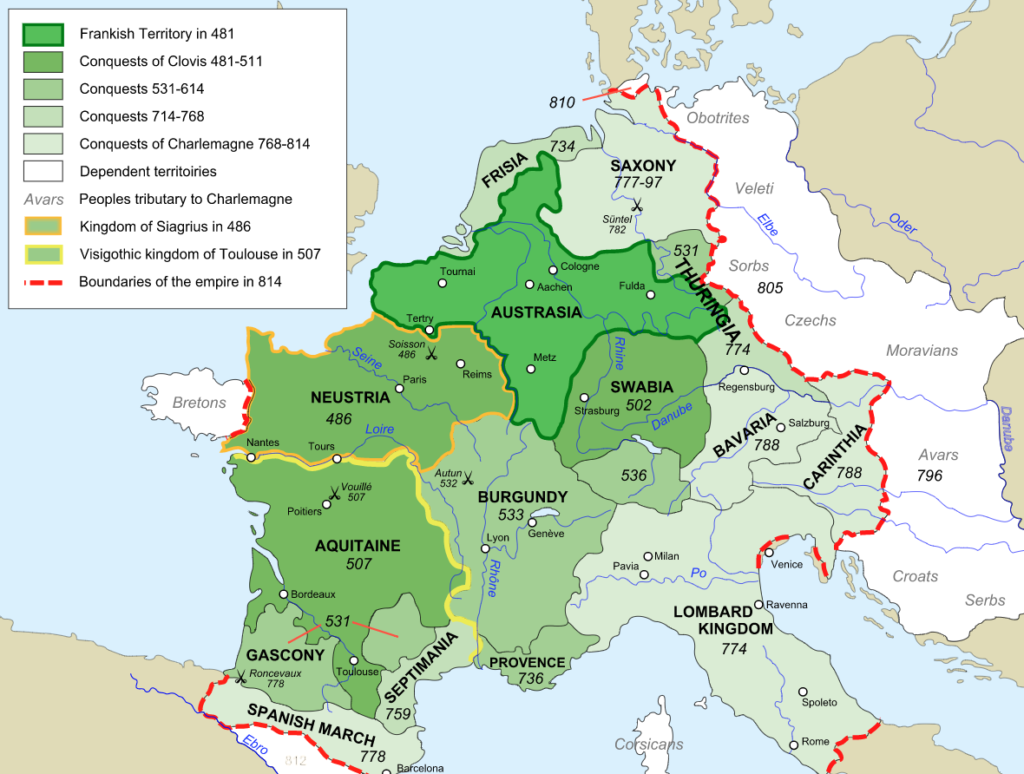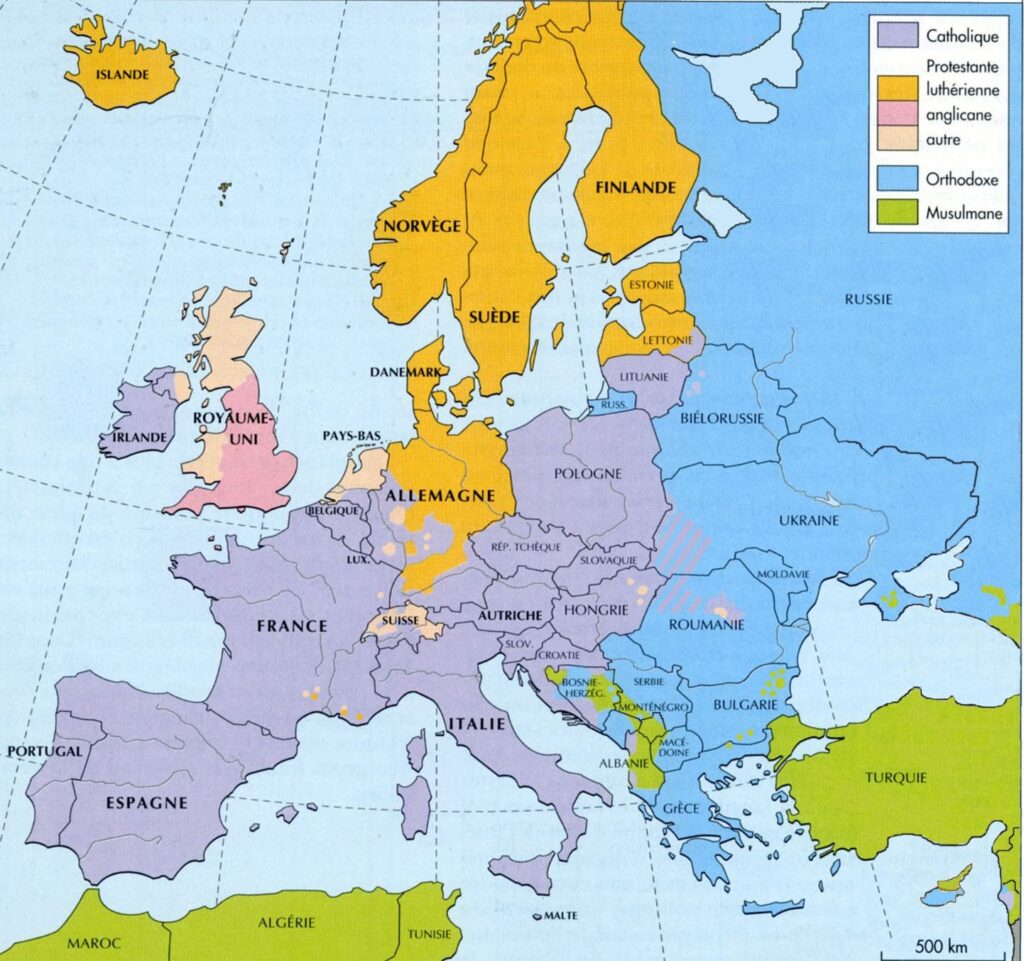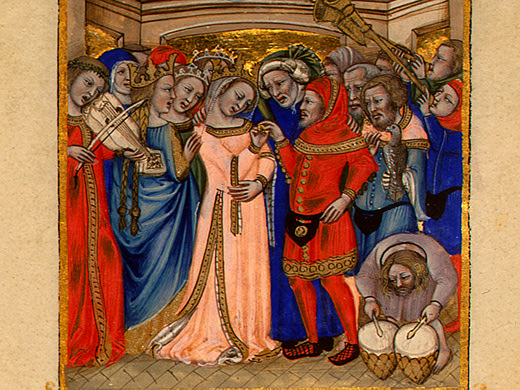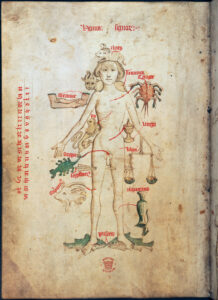How lies the land?
Okay, enough beating around the bush. How did North Western Europe give birth to the Renaissance? Why did rationality, trust, cooperation and the scientific method become a thing for the people in this tiny part of the planet? And the answer is : The Church declared cousin marriage taboo.
Yes, that’s right, I’m saying Christianity (or to be precise the mediaeval western Christian church) gave birth to science, logic and goodwill amongst strangers (Amen). Before, you leave this blog in disgust at such outrageous claptrap – please allow me to try and make this seemingly grotesque case.
Consider, if you will these 2 maps :

This first one above, represents the Frankish Empire. We can see that Rome was a part of that empire. Considering that the Franks and the Visigoths were 2 of the first cultures to convert to Christianity as proposed by Rome – this map also represents an early snapshot of the Western Christian Church.

This second one is a bit messier. It represents the major religions in (and around) Europe. The area under the influence of Rome (ie. the Medieval Western Christian Church) would be everywhere except the places in Blue (ie. Eastern Orthodox) and Green (ie. Islam). Also Portugal, Spain and southern Italy would have been less affected than their colour scheme would suggest, as they switched religions for long periods of their history. The Iberian peninsula being under Moorish rule for 800 years just prior to the Renaissance, and Southern Italy, for some reason, at times under the authority of Rome and at others, following the doctrines of the Eastern Orthodox Church.
The point is that this zone of influence of the mediaeval Western Christian Church, is precisely where we see the concepts of Humanism take hold – and of course Rationalism, the Scientific method, and all the other social changes we know as the Renaissance (e.g. banking, politics, art, technology). If you look back at the list of scientists and inventions in the last chapter, they all hail from here.
Weirdos & Normies
We also have data collected over the years as part of social research that clearly shows that these differences exist.
For example, we can look at which foreign diplomats stationed in New York get fined for parking illegally. New York is home to the United Nations headquarters, and we have data on which countries’ dignitaries have run up the most parking tickets, and how many of them bothered to pay. There is a huge difference between the diplomats whose ancestors hail from North West Europe and everybody else – with the descendants of the Vikings being the most squeaky clean. The Walk of Shame is led by Egypt, Nigeria, Indonesia and Brazil (source: Wall Street Journal).
The idea is that the people who recognise the importance of working with the mass of strangers that make up a city are those whose world view has been affected by the Renaissance. In other words, those that have integrated the principle that what is better for everyone (even non-kin) is also good for me.
The sociologists exploring the WEIRD hypothesis have also carried out surveys, with questions about the issues involved. Like would you trust a complete stranger (on a scale of 1 to 10)? Etc.
Game theory has also been used. Participants are invited to play games that test their ability to cooperate with a total stranger. Non-WEIRD players have a much harder time doing this. They can often get stuck with trust issues with the “outsider”, and are more willing to sabotage any group effort in order to punish another participant, who has become their enemy due to some perceived slight on their honour.
All of which seems to clearly indicate the huge differences in worldview between the minority of WEIRDo’s and the majority of normal folk – even when the data is adjusted for social status, education, age, wealth, etc.. The only thing other than a Northern European ancestry that affects any of the symptoms is proximity to a market. People who live closest to a market town, whatever continent they come from, are more able to trust a stranger than those living further away. Commerce builds trust. Which is an idea that is reflected in the folklore which proclaims we can no longer go to war with the Japanese, because we have bought their cars (or worse : fallen in love with their motorbikes).
Calvinism & coffee shops
Anyway, let’s get back to this crazy idea that Christianity paved the way for science and rationality. Preposterous! Luckily, many of us are familiar with the fact that correlation does not necessarily mean causation – Thank heavens. Since this contradicts all that we already know as atheists, history buffs and/or sceptics : I mean what about Galileo and the Inquisition? What about all the Christian fundamentalists telling us that evolution does not exist, even today?
And just to reassure all the anti-Christians out there : the claim does in no way imply that Christianity is the best religion, nor Jehovah the best God. The simple fact that Islam boasts the same God, and that Orthodox Christianity is also a form of Christianity, should put that argument to rest.
We might also address another familiar hypothesis, namely that of Protestantism as the motor for education, the sciences and humanism. This stemming from the idea that Protestants were supposed to take responsibility for their own understanding of doctrine, by reading the Bible themselves.
Truth used to be something that was known by special people and distributed onto the common folk as and when those special people deemed it necessary. In the case of Christianity, it was God who embodied the concept of Absolute Truth. His chosen representatives : the top echelon of Bishops and priests, would deliver the appropriate bits of God’s message when necessary.
So the idea that anyone could discover, or access God’s message, directly, without the need for some special representative or middleman, was pretty radical. It was very much in line with the cultural revolution of the time, aka : the renaissance. So, we’re not saying that Protestantism wasn’t part of the revolution, we’re saying that something happened in mediaeval Europe that set the stage for the renaissance. That led to the invention of the printing press, and thus the availability of cheap Bibles for people to read. That led to the idea that truth was something that could be discovered and demonstrated, and no longer some sort of magical knowledge in the hands of Kings and patriarchs alone.
The same goes for the Hypothesis that the scientific revolution was fueled by coffee. You may have heard of this. Here the idea is that the European brain was constantly addled by alcohol, due to the fact that their main beverage was beer. Everyone apparently preferring to drink beer rather than water. The microorganisms in beer being less dangerous and more tasty than those found in the unsterilised water. So when we went from being slightly drunk all the time to a coffee high, this was just what our brains needed.
Again, we are not suggesting that the advent and popularity of coffee houses did not play a significant part in the vibrant exchange of ideas in the capitals of 16th century Europe – what we would like to describe is what paved the way for the zeitgeist that would allow for debate, the notion that different opinions and theories of reality could be confronted at all – and that allowed the prevailing culture to even accept the notion that we could adopt some foreign habit like drinking tea and coffee, over our own good old tried and tested traditions. Also we want to know why all these intellectuals were hanging out in major cities in the first place.

Mediaeval upheaval
So, as we said : the mediaeval Christian church decided to ban cousin marriages. Unfortunately, there is no record of why. Nothing in the Bible indicates that we should not marry our relatives. So this was possibly just some quirk of fate due to local superstition. Maybe marrying your relative somehow got tied to something horrible like, for example, the plague. We have no idea, but whatever the reason the Church took it very seriously, and wherever they could, marriages between anyone and up to their seventh cousin removed, were not allowed.
This would have been a big deal – more than a big deal : a major, major headache. Firstly, who else were you going to marry? Everyone you knew was a cousin of sorts. Secondly, there was no other way to get married – marriage was something that happened by the grace of God – in a church. And most importantly : what was the point of getting married if you couldn’t keep it in the family? Up til that point, marriage was, at its core, all about strengthening the family ties and protecting its power and wealth – often in the form of land distribution via inheritance and dowries.
So marriage, as a way of reinforcing the clan, became a lot harder to organise successfully. Although, seeing how wealth is so closely tied to power and security, I imagine the rich and powerful continued to negotiate useful unions for at least their first born.
This still meant that the vast majority of young folk of marriageable age were forced to consider the possibility that their future lay outside their own clan.
This forced mass migration, away from their homeland, their ancestral stomping grounds, would have been the motor of momentous change.
Psychological change, in the sense that the people “out there”, the mysterious folk from beyond our valley, were no longer essentially a potential danger, with strange widdershin customs and beliefs. Suddenly other people became the promised land, they became hope. Even today, in places like the forests of New Guinea, people do not wander outside their territory. Because wandering outside our territory means wandering into someone else’s territory, which can be dangerous – especially if there are no hospitals and doctors around to patch up any serious wounds.
Change in the sense that “Truths”, customs, know-how and traditions were bound to be confronted in this huge “mixing of the clans”. Confronted in the sense that comparisons between different, time-honoured traditions were bound to happen. Comparisons that would reveal that not all time-honoured truths were actually true; that the so-called “correct way” was not always the best way. That “demonstrable truths” were far more useful than apparent truths (aka homegrown opinions).
The other major consequences of the cousin marriage ban were the growth and attractiveness of towns, and the development of craft guilds.

Towns and cities grew because all the young married people were no longer tied to one place. No longer was everyone set up in life, married to the person next door and tied to the piece of agricultural land allotted to them by their family. One potential source of livelihood and community that became available to newlyweds was the nearest bustling community open to all comers: the market town. Many of the leaders of these towns recognised that their population was a resource. In fact they did whatever they could to encourage newcomers to settle.
Craft guilds grew directly out of the idea that there were best working practices and bad ones – not just “the way we’ve allus done it”; and as a much needed community for all the artisans who no longer lived in the bosom of their ancestral villages.
So there we have it : a theory on how Humanism and Rationality were set in motion. Complete with data confirming the differences between WEIRDo’s and traditional folk, and historical facts that describe a sort of proto-renaissance. Proto-renaissance in the sense that people were forced to consider the whole population of humanity at large as an in-group, and to reconsider all their ancestral ways in the light of comparison.
